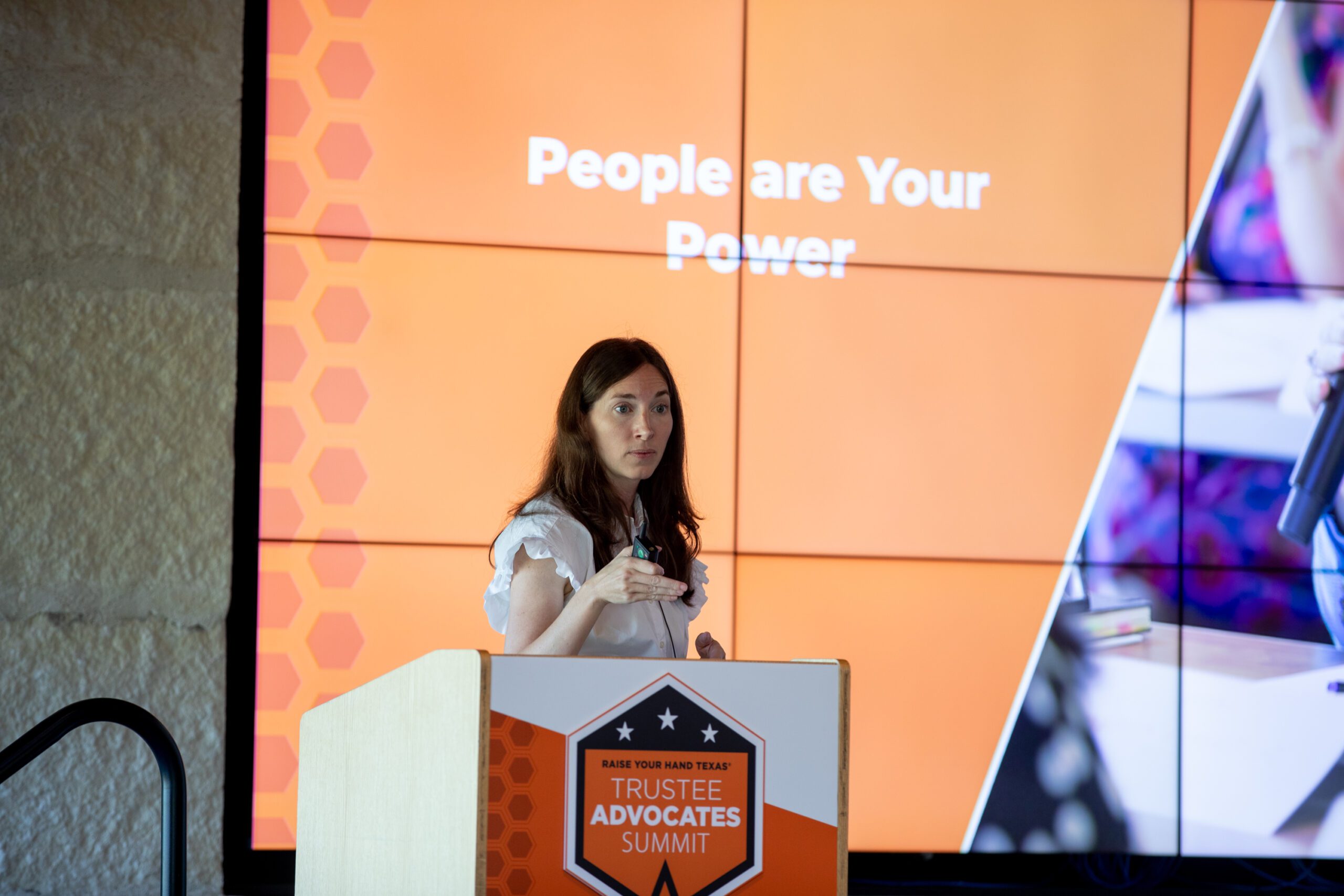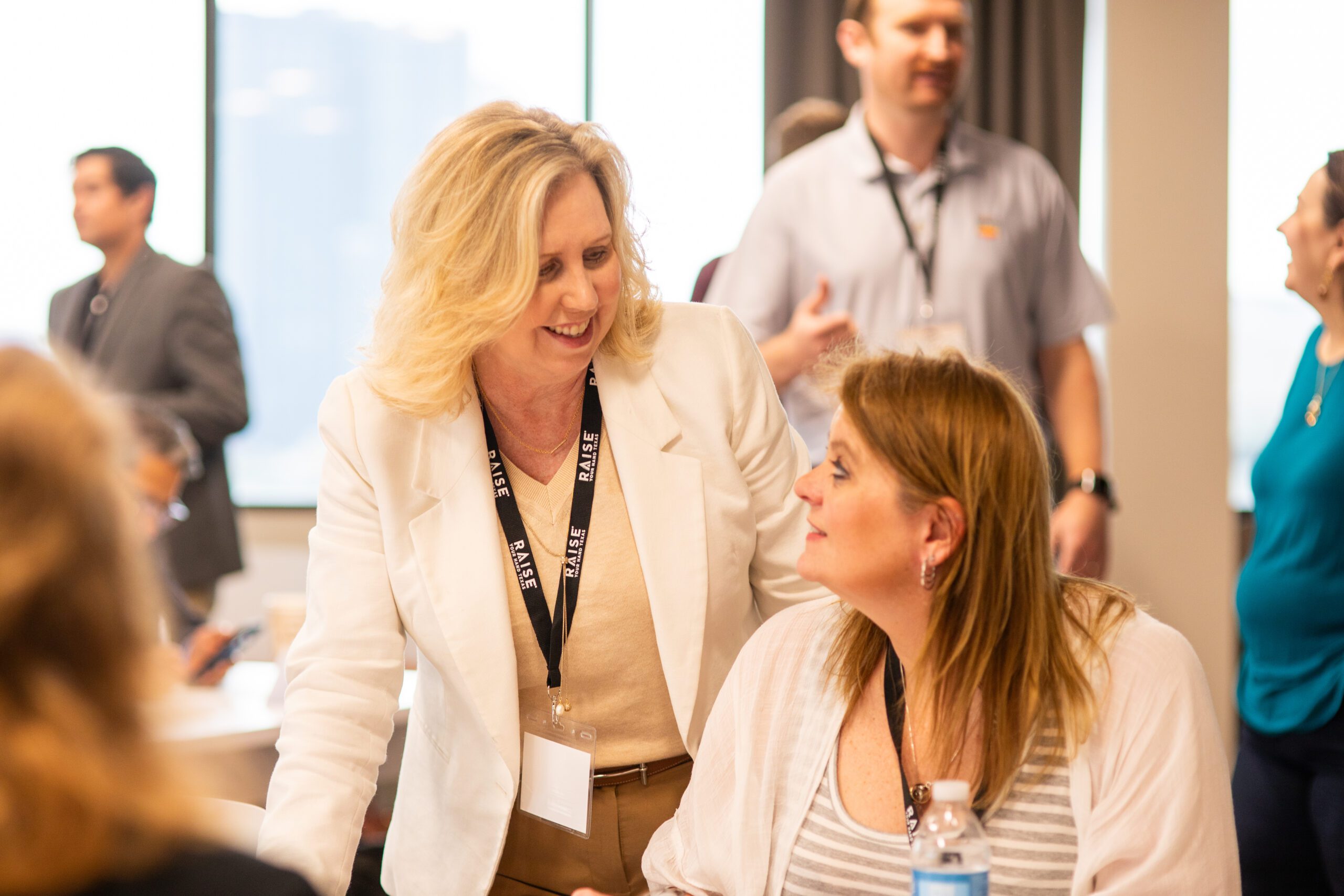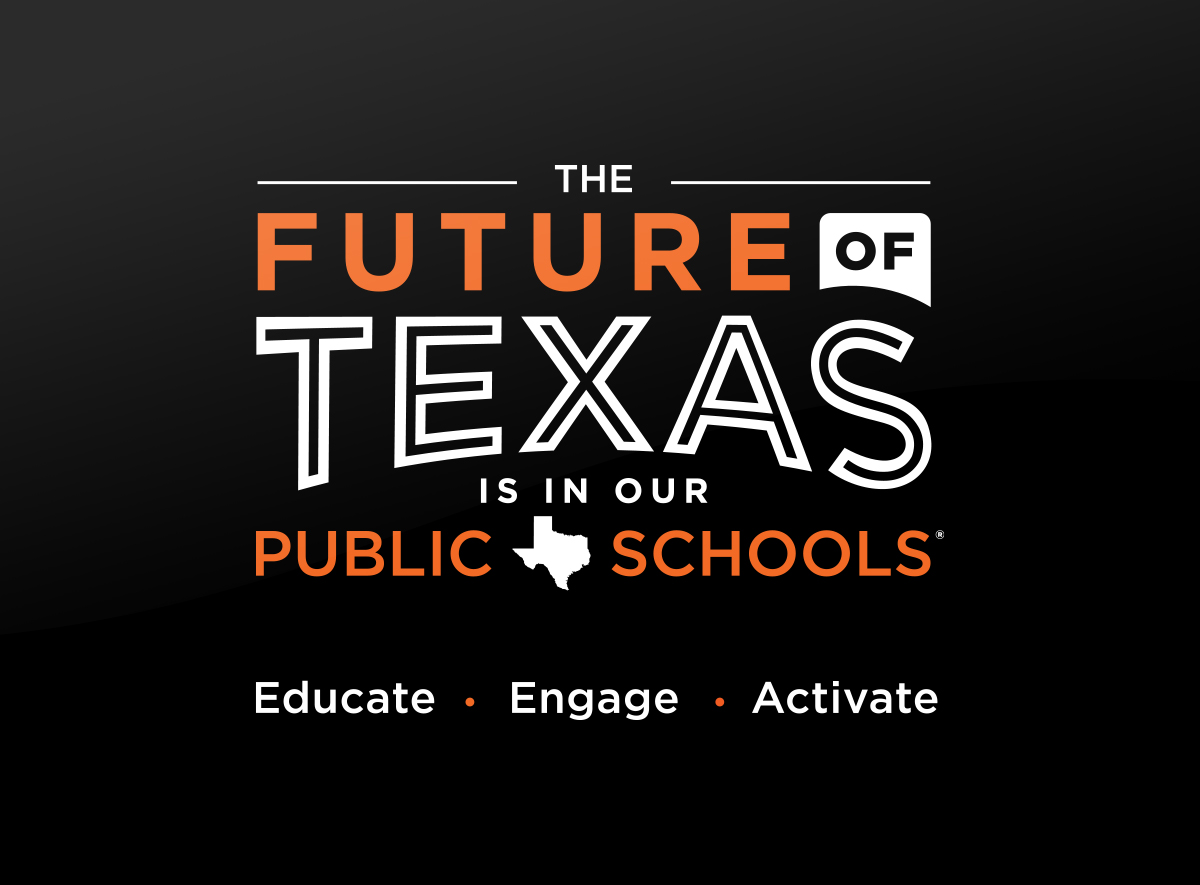
categories
An Educator’s Journey to Reclaim Her Roots

January 27, 2022
ADVOCACY
An Educator’s Journey to Reclaim Her Roots
January 27, 2022
In the midst of navigating storm Uri, a principal experienced a personal awakening that would change how she shows up as a leader.
The evening of Feb. 11, 2021, a rare snow started to fall on Central Texas.
At the time, Natalia Gómez Ramback was principal at Ruth Barron Elementary School in Pflugerville ISD. Ramback recalls canceling classes on Friday the 12th due to dangerous road conditions. The weekend remained cold and icy. By the evening of the 14th, Winter Storm Uri swept in a new layer of ice and snow. Then the Texas power grid began to fail, leaving millions without electricity and heat.
“Little did we know that what we saw was nothing compared to what was coming,” Ramback says. “It was interesting as one day turned into two, two turned into three … no matter what your socioeconomic status, things became very dire very quickly.”
Ramback texted her staff to ensure everyone was safe and together they called families they were concerned may not have a warm place to go. She and her husband Tim sheltered two sets of friends at their home in Georgetown, Texas. “During those times without electricity, we made the most of being together and played games by candlelight.”
On Thursday, Feb. 18, Ramback got a call that her campus had flooded. A frozen water line had burst, causing over $400,000 of water damage. Personal items and teaching supplies were destroyed.
Responding to the compounding crises, Ramback and her team prioritized the wellbeing of the community. She led home visits to check in on everyone in the neighborhoods surrounding the school — it didn’t matter if families had a school-aged child or not. For the next three weeks, all of Ramback’s in-person students were transported to a neighboring school building. She said the community rallied together, cared for one another, and showed tremendous resiliency.
The power in personal stories
When the storm first hit, Ramback was transported back in time. Growing up, she lived in a mobile home in South Texas. She recalls how bitterly cold the winters were, and how they heated the trailer with calentadores (small gas heaters). The calentadores couldn’t be left on all night for fear of carbon monoxide poisoning. Her family started the evenings warm, but could not escape the deepening cold that set in throughout the night. She remembers the pile of blankets, and curling up close to one of her sisters.
As the Barron Elementary School community gathered in the wake of the storm, Ramback took a moment to share her childhood memories with her staff and students. They understood her story. Many of them were living it, if only for a few days.
“In a meeting, I shared with them that one of the most profound things for me was being taken back to my childhood and remembering what it was like. Sorry, I do get a little emotional because I’m ashamed that I was embarrassed to show a picture of my home growing up because it looked like a junkyard. What some people would say was not a home. It was very old, things were falling apart. Now I see it as an opportunity to connect with my kids in a way that I used to think was food and culture, but this transcends so many different things, and it becomes about survival.”
The staff at Barron Elementary serve some of the poorest student population in Pflugerville ISD. According to Texas Academic Performance reports from the 2018-19 school year, 82% of the student body is considered economically disadvantaged. Many students live in the Dessau Fountain Estates mobile home community near the school. Ramback sees herself in her students and that’s what first drew her to the campus the year before. Yet, prior to the storm, she felt like hadn’t been able to fully connect and share her authentic self.
“Sometimes, as a leader, we forget the power in our own stories and not only showing that vulnerability, but showing people that it’s possible to go beyond the socio-economic situation you were born into.”
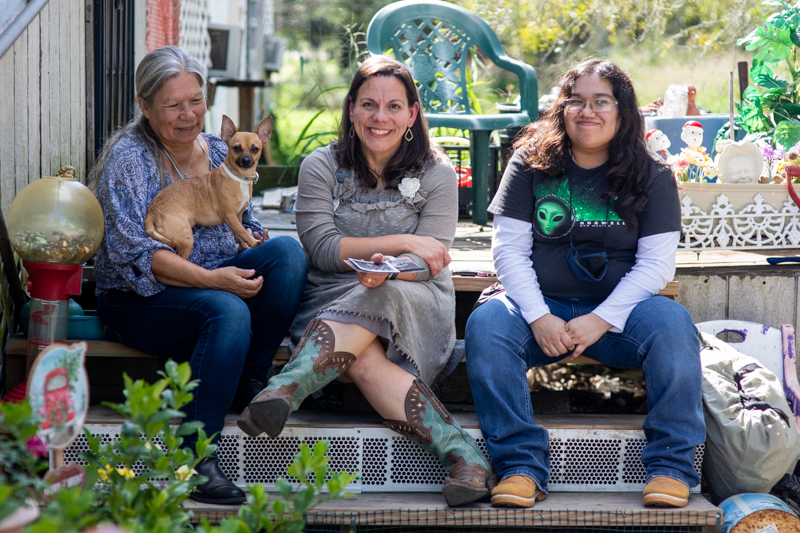
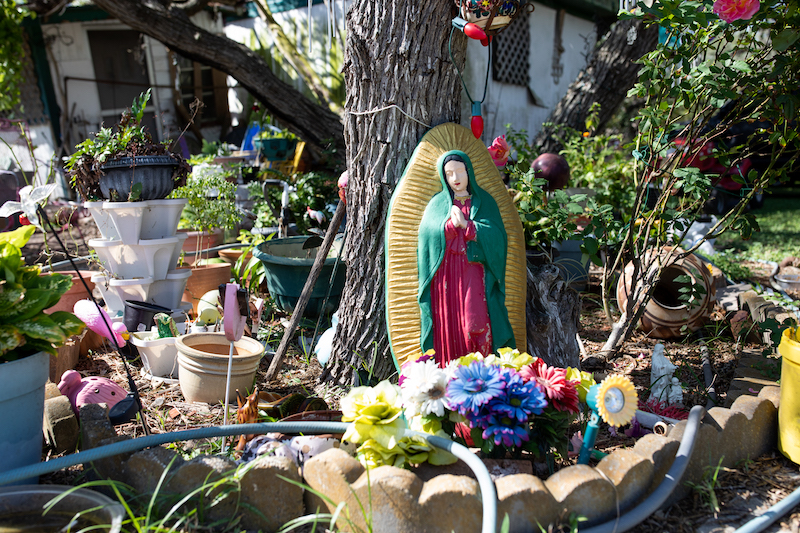

Natalia Goméz Ramback revisits the family home where she was raised. She sits on the porch with her sister Martha (left), niece Angelica (right), and Pearl the chihuahua who are the current stewards of the land and home.
Papalote years
Ramback is the youngest of 10, raised by her grandparents in Papalote, Texas, a small community about 40 minutes north of Corpus Christi. If you blink while driving along the small stretch of highway 181, you might just miss it.
El Rancho, as Ramback’s family called their small plot of land, is nestled right off the highway.
“Growing up, my grandfather, a World War II veteran, was a very, very proud American. He had a first-grade education. His family were migrant workers. My grandmother grew up in Benavidez, Texas. She had a big family and she went to the sixth grade. To them, education was extremely important, and being an American was also very, very important.”
Ramback’s grandparents were very active in the volunteer fire department. Her grandfather helped keep the fire engines ready and responded to emergency calls. The department also served as a community center and the county’s voting site. From the time Ramback was four or five, she remembers going out to the firehouse on election day. She remembers the excitement and the crowds of people. Most of all, she remembers how proud her grandparents were to cast a vote and help others do the same. Years later, she realized the significance of what they modeled. Ramback sees her grandparents as the American dream in action and her generation as the culmination of their hard work and dedication to this country.
“My grandfather was very, very, very proud of, one, not only being an American, but being able to be educated and live that American dream. One of the things that he used to say to our family is, ‘I work with my hands and I work really hard so that you guys don’t have to work with your hands. You get to work with your mind.’ That is something that I’m very proud of where I am.”
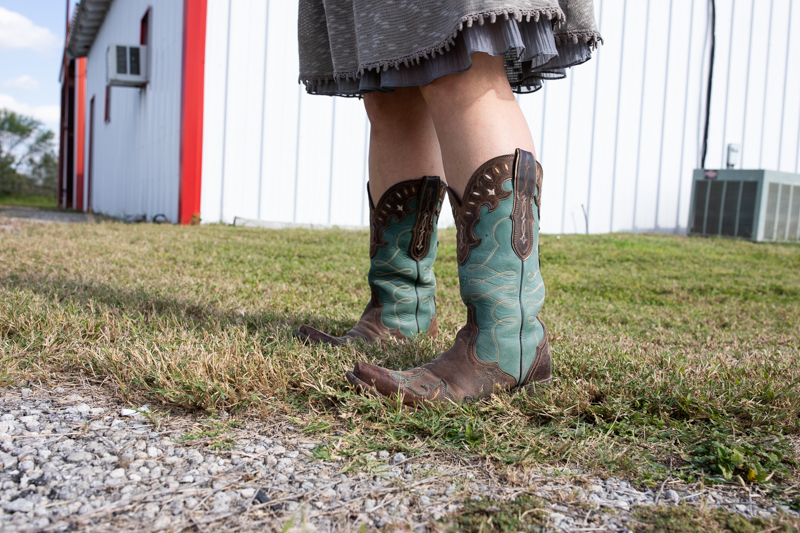
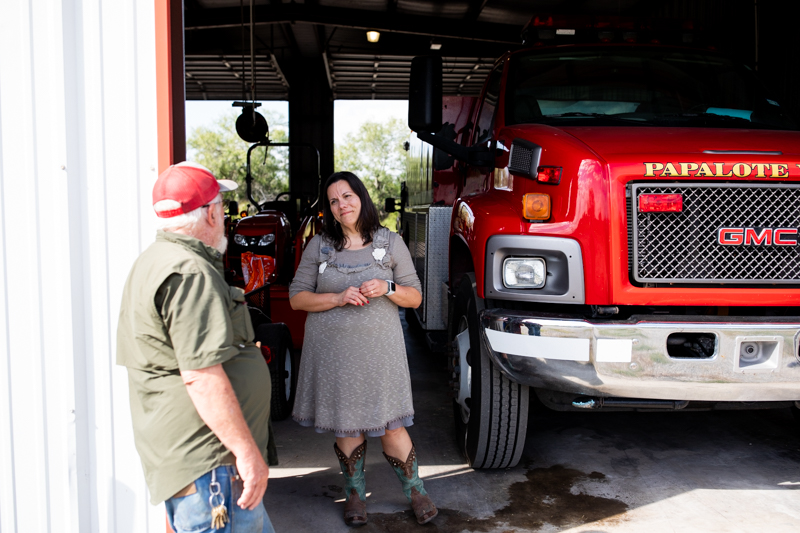
On a recent trip to Papalote, Ramback paid a visit to the volunteer firehouse where her grandparents volunteered for many years.
Ramback graduated from Texas A&M University at Corpus Christi with a degree in bilingual education and moved to Austin on a whim to explore what she called “the big city.”
She was drawn to bilingual education as a way of honoring her Mexican American culture and helping her students do the same. “As Mexican American people or as bilingual people, sometimes you step away from who you are because you think that’s what you’re supposed to do. And I’ve learned through my life that, when you do that, you give away part of yourself. And I don’t want kids to ever have to do that.”
She interviewed for positions at two different campuses in Georgetown ISD. One of them was Frost Elementary school. The school leader was a first-year principal named Alma Guzman Molleur. “I remember walking into her office and she reminded me of my sister, Ruth, and that endeared me immediately.” She got the job and Molleur became her mentor.
Ramback says she admired Molleur’s fearlessness and strong sense of self as a leader. “I don’t know that she knew that and that I could see that? I don’t know that I’ve ever told her that because she’s still in my life today. I watched her become one of the most authentic people I have ever known.”
When Ramback became an assistant principal and later a principal, she continued to learn from Molleur’s leadership and counsel. In 2014, Molleur encouraged Ramback to apply to attend the Harvard Leadership Institutes through the Raising School Leaders program, previously led by the Raise Your Hand Texas Foundation and now part of the Charles Butt Foundation. She was accepted and Ramback joined Molleur as part of the Raise Your Hand Texas alumni network. Ramback continued to dig deeper into leadership development opportunities, and later principal advocacy.
Ramback reflects how, as she moved into formal leadership roles, she felt the need to look and act a certain part. She traded in her colorful earrings and blouses for neutrals and dark tones. Without realizing it, she was suppressing pieces of her Mexican American identity to fit a certain idea of what leadership looks like.
“In my mind, I knew that I should be who I was and be my authentic self, but my fear and those little voices in your head, I tried to be somebody else. That’s hard for me to admit because I know that was not the best thing to do, but it was what I thought I needed to do.”
Living through Winter Storm Uri and the COVID-19 pandemic reawakened many of Ramback’s childhood memories and caused deep reflection on who she is and the impact she hopes to make. She committed to herself and her community to recover the pieces of her identity she had shed. She wanted to fully display her authentic self and showcase where she came from.
At the end of the 2020-2021 school year, Ramback felt closer to her students and faculty for having reconnected with her roots and sharing her story openly.
“The last year and a half has been the hardest in my career in many ways, but I wouldn’t change it because it helped me grow as a leader and as a person in such profound ways that I would go through it again if it meant that I would be a better leader and a better person moving forward.”
Ramback poses in front of the Texas State capitol. She’s been passionate about voter engagement and community building since childhood. As a regional advocacy director for Raise Your Hand Texas, she will hold town halls and candidate forums, uplift educator voices, and build coalitions around pressing education issues. In the summer of 2021, Ramback joined the Raise Your Hand Texas team as the Regional Advocacy Director for Central Houston. In this role, she will hold town halls and candidate forums, build coalitions around public education issues, and amplify educator voices. “My husband, he laughs because he says, ‘Now you get to do for a job, what you spent so much of your volunteer time doing,’ … It’s an extension of what I was already doing, just in a deeper way.” While heartbroken to leave her campus community, she felt like her life had been building toward this opportunity to further honor her grandparents’ legacy as an engaged citizen and community builder. “The impact that I hope to make is to either ignite or reignite a fire in our education advocates and to become part of the community to the point where we are working as a unit. That’s what somebody did for me. That’s what my experiences have done for me.”
Connect with your regional advocacy director to get engaged with the education issues impacting your local community. 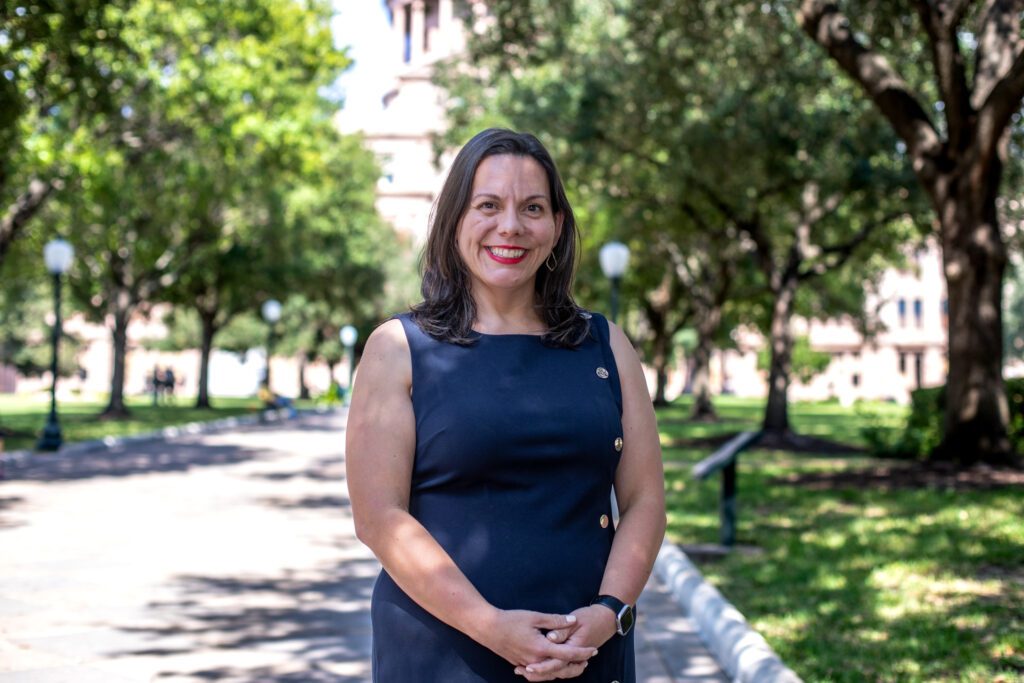
New beginnings
